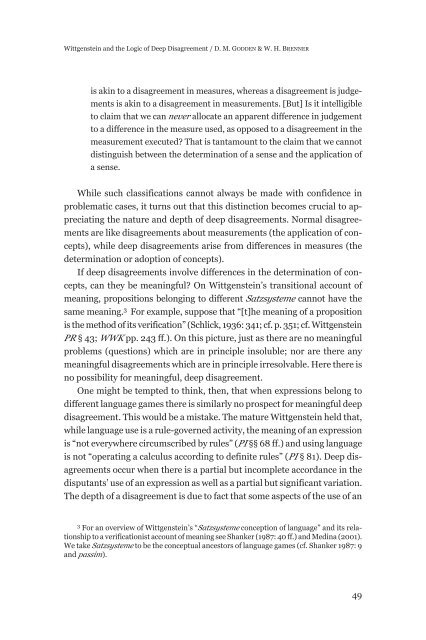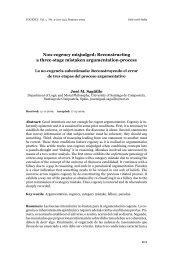Cogency v2 n2
Cogency v2 n2
Cogency v2 n2
Create successful ePaper yourself
Turn your PDF publications into a flip-book with our unique Google optimized e-Paper software.
Wittgenstein and the Logic of Deep Disagreement / D. M. GODDEN & W. H. BRENNER<br />
is akin to a disagreement in measures, whereas a disagreement is judgements<br />
is akin to a disagreement in measurements. [But] Is it intelligible<br />
to claim that we can never allocate an apparent difference in judgement<br />
to a difference in the measure used, as opposed to a disagreement in the<br />
measurement executed? That is tantamount to the claim that we cannot<br />
distinguish between the determination of a sense and the application of<br />
a sense.<br />
While such classifications cannot always be made with confidence in<br />
problematic cases, it turns out that this distinction becomes crucial to appreciating<br />
the nature and depth of deep disagreements. Normal disagreements<br />
are like disagreements about measurements (the application of concepts),<br />
while deep disagreements arise from differences in measures (the<br />
determination or adoption of concepts).<br />
If deep disagreements involve differences in the determination of concepts,<br />
can they be meaningful? On Wittgenstein’s transitional account of<br />
meaning, propositions belonging to different Satzsysteme cannot have the<br />
same meaning. 3 For example, suppose that “[t]he meaning of a proposition<br />
is the method of its verification” (Schlick, 1936: 341; cf. p. 351; cf. Wittgenstein<br />
PR § 43; WWK pp. 243 ff.). On this picture, just as there are no meaningful<br />
problems (questions) which are in principle insoluble; nor are there any<br />
meaningful disagreements which are in principle irresolvable. Here there is<br />
no possibility for meaningful, deep disagreement.<br />
One might be tempted to think, then, that when expressions belong to<br />
different language games there is similarly no prospect for meaningful deep<br />
disagreement. This would be a mistake. The mature Wittgenstein held that,<br />
while language use is a rule-governed activity, the meaning of an expression<br />
is “not everywhere circumscribed by rules” (PI §§ 68 ff.) and using language<br />
is not “operating a calculus according to definite rules” (PI § 81). Deep disagreements<br />
occur when there is a partial but incomplete accordance in the<br />
disputants’ use of an expression as well as a partial but significant variation.<br />
The depth of a disagreement is due to fact that some aspects of the use of an<br />
3<br />
For an overview of Wittgenstein’s “Satzsysteme conception of language” and its relationship<br />
to a verificationist account of meaning see Shanker (1987: 40 ff.) and Medina (2001).<br />
We take Satzsysteme to be the conceptual ancestors of language games (cf. Shanker 1987: 9<br />
and passim).<br />
49








